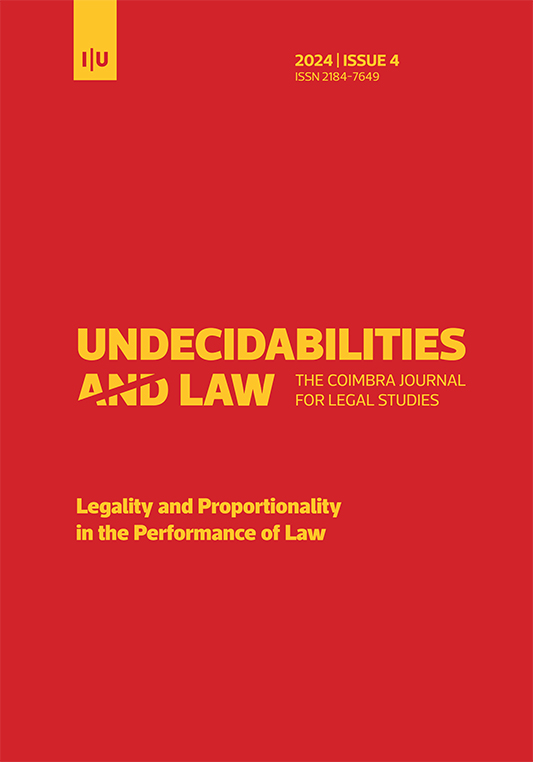Are There Really “Tragic Cases”?
A Critical Analysis of Manuel Atienza’s Proposal
DOI:
https://doi.org/10.14195/2184-9781_4_6Keywords:
Easy, Hard and Tragic cases, Theory of legal argumentation, Positive Law, Claim to correctness, Rationality, Democratic Rule of LawAbstract
The aim of this article is to critically analyze the concept of the tragic case proposed by Manuel Atienza, starting from the same basis – the work of Robert Alexy –, but reaching very different conclusions. In the light of the parameters presented by Alexy (correctness, rationality, legal argumentation, human rights), the inadmissibility of some of Atienza's central assertions about tragic cases is exposed (such as the absence of a correct answer, the limitation of legal rationality, the option for the lesser evil), as well as the unsustainability of the very notion of tragic cases itself.
Downloads
References
Aarnio, A. (1987). The rational as reasonable: a treatise on legal justification, Springer.
Alexy, R. (2000). On the Thesis of a Necessary Connection between Law and Morality: Bulygin’s Critique. Ratio Juris, 13(2), 138–147.
Alexy, R. (2002). A theory of constitutional rights, trans. J. Rivers. Oxford Press.
Alexy, R. (2007). The weight formula. In J. Stelmaech et al. (Ed.), Studies in the Philosophy of Law: frontiers of the economic analysis of law (pp. 09–27). Jagiellonian University Press.
Alexy, R. (2008). On the Concept and the Nature of Law, Ratio Juris, 21(3), 281–299.
Alexy, R. (2009). The reazonableness of law. In G. Bongiovanni et al., Reasonableness and Law (pp. 05–15). Springer.
Alexy, R. (2010a). A Theory of Legal Argumentation – The theory of rational discourse as theory of legal justification, trans. R.Adler and N.MacCormick. Oxford University Press.
Alexy, R. (2010b). The dual nature of law, Ratio Juris, 23(2), 167–182.
Alexy, R. (2015). Legal certainty and correctness, Ratio Juris, 28(4), 441–451.
Alexy, R. (2021). Jürgen Habermas’s Theory of the Indeterminacy of Law and the Rationality of Adjudication. In R. Alexy, Law’s Ideal Dimension (pp. 299–311), Oxford University Press.
Atienza, M. (1997). Los limites de la interpretación constitucional – de nuevo sobre los casos trágicos [The limits of constitutional intepretation – once again about tragic cases], Isonomía 6, 07–30.
Atienza, M. (2003). As razões do Direito – Teorias da argumentação jurídica [The reasons of Law – Theories of legal argumentation], São Paulo: Landy.
Atienza, M. (2006). El derecho como argumentación [Law as Argumentation]. Barcelona: Ariel.
Cooke, M. (2007). Law’s Claim to Correctness. In G. Pavlakos (Ed.), Law, Rights and Discourse – The legal philosophy of Robert Alexy (pp. 225–247), Hart Publishing.
Dworkin, R. (1975). Hard Cases. Harvard Law Review, 88(6), 1057–1109.
Habermas, J. (1996). Between Facts and Norms – Contributions to a discourse theory of law and democracy, trans. William Rehg, MIT Press.
Habermas, J. (1989). Para o uso pragmático, ético e moral da razão prática [For the pragmatic, ethical and moral use of practical reason], Estudos Avançados, 3(7), 04–19.
Kant, I. (1964). Groundwork of the Metaphysic of Morals, Trans. H.J.Paton. Harper & Row.
Kuhn, T. (1970). The structure of scientifc revolutions (2nd ed.). University of Chicago Press.
Peczenik, A. (1989). On law and reason, Dordrecht-Boston-Londres: Kluwer Academic Publishers.
Perelman, C. & Olbrechts-Tyteca, L. (1969). The new rethoric – A treatise on argumentation. Notre Dame Press.
Popper, K. (1978). Lógica das Ciências Sociais [Social Sciences Logic]. Tempo Brasileiro.
Popper, K. (1997). O Realismo e o Objetivo da Ciência [Realism and the Objective of Science], Publ. D. Quixote.
Toulmin, S. E. (1958). The uses of argument. Cambridge.
Wright, G. H. v. (1993). Images of science and forms of rationality. In G. H. von Wright (Ed.), The tree of knowledge and other essays (pp. 172–192), Brill.
Downloads
Published
How to Cite
Issue
Section
License
Copyright (c) 2025 Cláudia Toledo

This work is licensed under a Creative Commons Attribution 4.0 International License.



